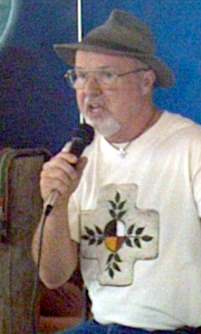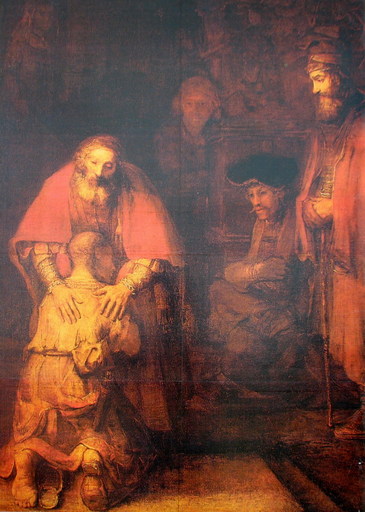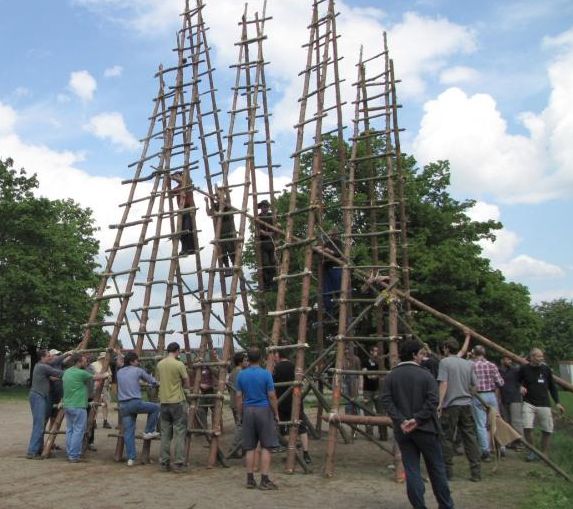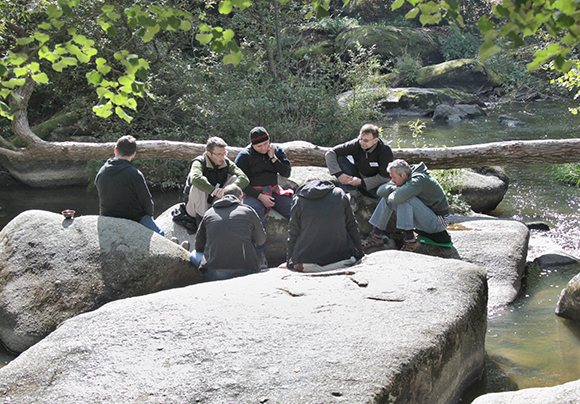
Starý muž, který se neumí smát, je trouba.
Richard Rohr
Kdo jsme?
Tento web reprezentuje hnutí Chlapi, neformální společenství mužů, kteří hledají takové způsoby duchovního prožívání, se kterými se dokážou jako muži ztotožnit a celou bytostí je žít.
Můžeš se tady setkat s muži, kteří usilují o to být lepšími a více autentickými.
Vytváříme jak reálný tak virtuální prostor pro setkávání.
Začalo to někdy před rokem 2000 hledáním mužské energie, spirituality i chlapské party a setkáváním v malých skupinách. Pokračovalo to inspirací dílem Richarda Rohra a jeho Rituálem pro přechod do zralé dospělosti a pokračuje to dodnes stovkami setkání v malých skupinách, víkendovými akcemi pro muže i pro otce a děti, rituály i celostátními setkáními pro stovky účastníků a mezinárodní spoluprací s hnutím mužů po celém světě.
Pro řadu z nás je podstatné přátelství s Bohem, pro všechny jsou oporou kamarádi, které tu nalezli.
Vítáme tě mezi námi a těšíme se na společné putování.

Pavel Hrdina a Martin Šmídek
Překlad meditace CAC ze čtvrtka 4. 8. 2022
na téma:
Nevinnost
| Kontemplace odhaluje naše rány Benediktinská sestra Joan Chittisterová se zamýšlí nad moudrým učením pouštních otců. Doporučujeme vám přečíst si toto učení abbého Mojžíše o iluzi nevinnosti a pokořující pravdě, že všichni jsme zranění: Jeden bratr se ve Scetisu dopustil hříchu, shromáždili se starší a poslali pro abbu Mojžíše. Ten však nechtěl jít. Kněz k němu tedy poslal vzkaz: "Přijď, všichni na tebe čekají." Nakonec se tedy zvedl a šel. Vzal opotřebovaný koš s dírami, naplnil ho pískem a nesl ho s sebou. Lidé, kteří mu přišli naproti, říkali: "Co je to?" Stařec odpověděl: "Ne, ne, ne, ne, ne, ne, ne, ne, ne, ne: "Mé hříchy utíkají za mnou, ale já je nevidím. A dnes jsem přišel, abych soudil hříchy někoho jiného." Když to uslyšeli, nic bratrovi neřekli a odpustili mu. Sestra Johanka popisuje, jak nám kontemplace pomáhá poznat a přijmout sebe i druhé takové, jací skutečně jsme: Pouštní mniši mají jasno: Sebemrskačství je krutost páchaná ve jménu spravedlnosti. Je samozřejmě myslitelné, že bychom mohli najít řeholníka, který je samospravedlivý. . . . Je docela dobře možné, že se setkám se samospravedlivým přítelem, sousedem nebo dokonce členem rodiny. Není však možné najít samospravedlivého kontemplativního člověka. Ne skutečného kontemplativce. Kontemplace nás láme k sobě samým. Ovocem kontemplace je sebepoznání, nikoli sebeospravedlňování. "Čím více se přibližujeme k Bohu," říká abba Mateos, "tím více vidíme sami sebe jako hříšníky." Vidíme se takoví, jací skutečně jsme, a s poznáním sebe sama nemůžeme odsuzovat druhé. S ruměncem vzpomínáme na veřejný hřích, který nás učinil smrtelnými. S hrůzou poznáváme soukromý hřích, který se v nás svíjí ve strachu z odhalení. Celý svět se pak změní, když poznáme sami sebe. Jsme k němu jemní. Ovocem sebepoznání je laskavost. Zlomeni sami sebou něžně obvazujeme rány druhého. . . . Krutost není plodem rozjímání. Ti, kdo se dotkli Boha, který žije v nich samých, se všemi svými zápasy, se všemi svými nedostatky, vidí Boha všude a především v bezmocném, křehkém, prosícím, vyděšeném druhém. Kontemplující neposuzují srdce druhého podle měřítka, na kterém by sami nemohli být ospravedlněni. Úskalím náboženství dokonalosti je samospravedlnost, ona rakovina duše, která od druhých vyžaduje víc, než vyžaduje sama od sebe, a tak ještě více nahlodává vlastní vlákna. Je to vnitřní slepota, která počítá hříchy druhých, ale nemá oči pro sebe. . . . Skuteční kontemplativci přijímají druhé s otevřenou Boží náručí, protože poznali, že přes všechnu jejich prázdnotu je Bůh přijal. Chceme-li být kontemplativci, je třeba bez výhrad přijímat ty, které svět zavrhuje, protože právě oni nám nejzřetelněji ukazují tvář čekajícího Boha. Fr. Richard Rohr, OFM přeloženo DeepL | Contemplation Reveals Our Wounds
Benedictine sister Joan Chittister reflects on a wisdom teaching from the Desert Fathers. We encourage you to read this teaching from Abba Moses on the illusion of innocence and the humbling truth that we all are wounded: Once a brother committed a sin in Scetis, and the elders assembled and sent for Abba Moses. He, however, did not want to go. Then the priest sent a message to him, saying: “Come, everybody is waiting for you.” So he finally got up to go. And he took a worn-out basket with holes, filled it with sand, and carried it along. The people who came to meet him said: “What is this?” Then the old man said: “My sins are running out behind me, yet I do not see them. And today I have come to judge the sins of someone else.” When they heard this, they said nothing to the brother and pardoned him. Sister Joan describes how contemplation helps us to recognize and to accept ourselves, and others, as we truly are: The desert monastics are clear: Self-righteousness is cruelty done in the name of justice. It is conceivable, of course, that we might find a self-righteous religious. . . . It is probable that I might very well find myself dealing with a self-righteous friend or neighbor or even family member. But it is not possible to find a self-righteous contemplative. Not a real contemplative. Contemplation breaks us open to ourselves. The fruit of contemplation is self-knowledge, not self-justification. “The nearer we draw to God,” Abba Mateos said, “the more we see ourselves as sinners.” We see ourselves as we really are, and knowing ourselves we cannot condemn the other. We remember with a blush the public sin that made us mortal. We recognize with dismay the private sin that curls within us in fear of exposure. Then the whole world changes when we know ourselves. We gentle it. The fruit of self-knowledge is kindness. Broken ourselves, we bind tenderly the wounds of the other. . . . Cruelty is not the fruit of contemplation. Those who have touched the God who lives within themselves, with all their struggles, all their lack, see God everywhere and, most of all, in the helpless, fragile, pleading, frightened other. Contemplatives do not judge the heart of another by a scale on which they themselves could not be vindicated. The pitfall of the religion of perfection is self-righteousness, that cancer of the soul that requires more of others than it demands of itself and so erodes its own fibre even more. It is an inner blindness that counts the sins of others but has no eye for itself. . . . Real contemplatives receive the other with the open arms of God because they have come to know that for all their emptiness God has received them. To be a contemplative it is necessary to take in without reservation those whom the world casts out because it is they who show us most clearly the face of the waiting God. Fr. Richard Rohr, OFM |
Zde se nacházejí překlady Daily Meditations, jejichž anglické originály se nacházejí na webu CAC. V den jejich vydání je zde nalezneš přeložené strojově pomocí DeepL, zpravidla do druhého dne pak projdou jazykovou úpravou někým z týmu překladatelů :-) Pokud vládneš dobrou angličtinou, přihlas se asi raději přímo u zdroje těchto úvah, tedy na webu CAC. Budeš je pak do své mailové schránky dostávat již k ranní kávě. -mš-
 Myšlenka Richarda Rohra na první neděle postní - Milost Boží láska je naprostá, bezpodmínečná, absolutní a je navždycky. Stav milosti – totiž Boží přístup k nám – je věčný. Jen my jsme ti, kteří se mění. Někdy jsme schopni uvěřit, že nás Bůh miluje bezpodmínečně, absolutně a navždy. A to je milost! Jindy zas, když jsme schlíplí a zatížení pocitem viny, strachu a tíže, nejsme schopni uvěřit, že nás Bůh miluje. …
Myšlenka Richarda Rohra na první neděle postní - Milost Boží láska je naprostá, bezpodmínečná, absolutní a je navždycky. Stav milosti – totiž Boží přístup k nám – je věčný. Jen my jsme ti, kteří se mění. Někdy jsme schopni uvěřit, že nás Bůh miluje bezpodmínečně, absolutně a navždy. A to je milost! Jindy zas, když jsme schlíplí a zatížení pocitem viny, strachu a tíže, nejsme schopni uvěřit, že nás Bůh miluje. …




